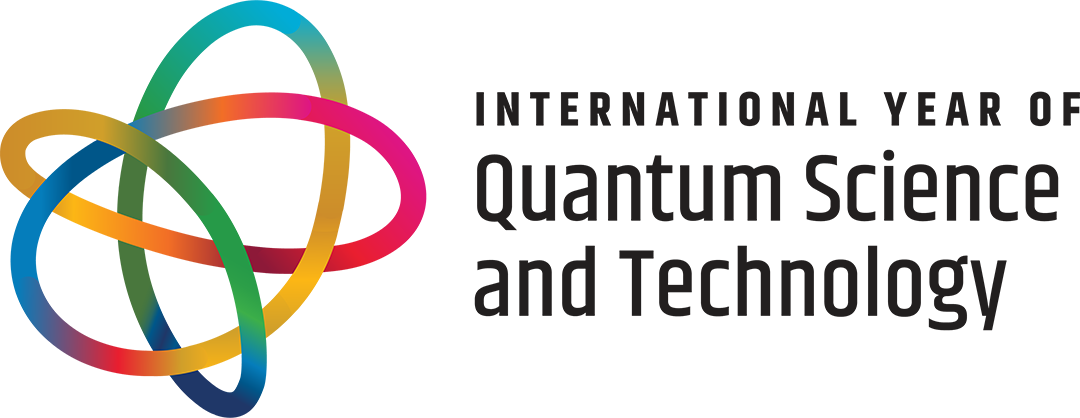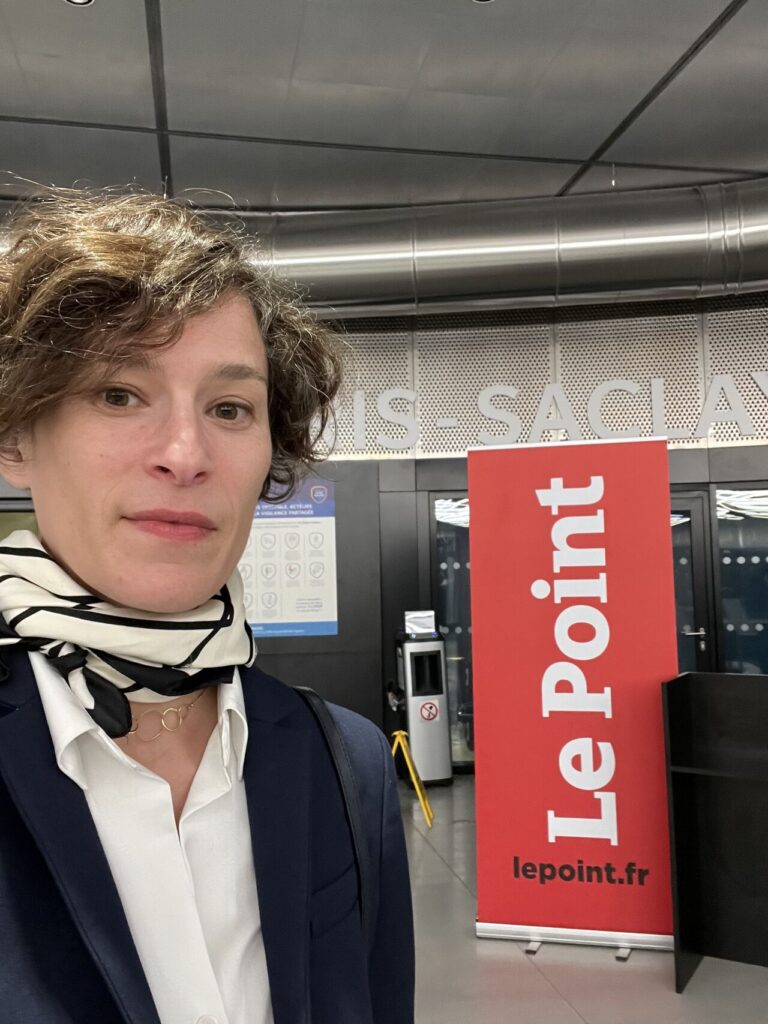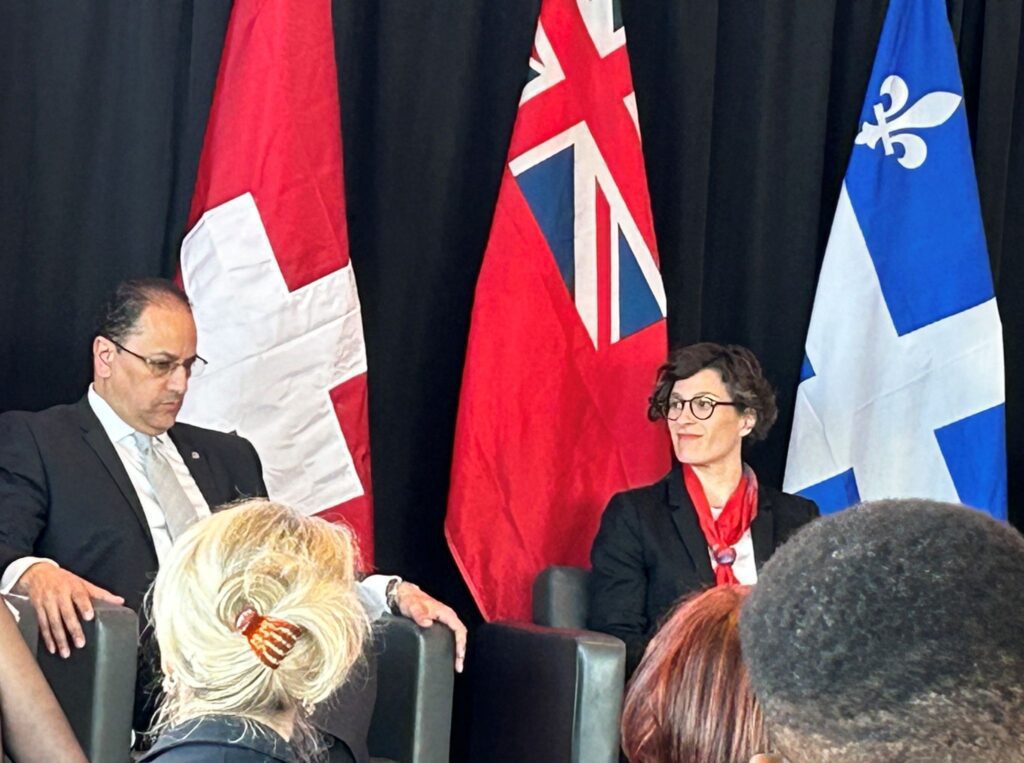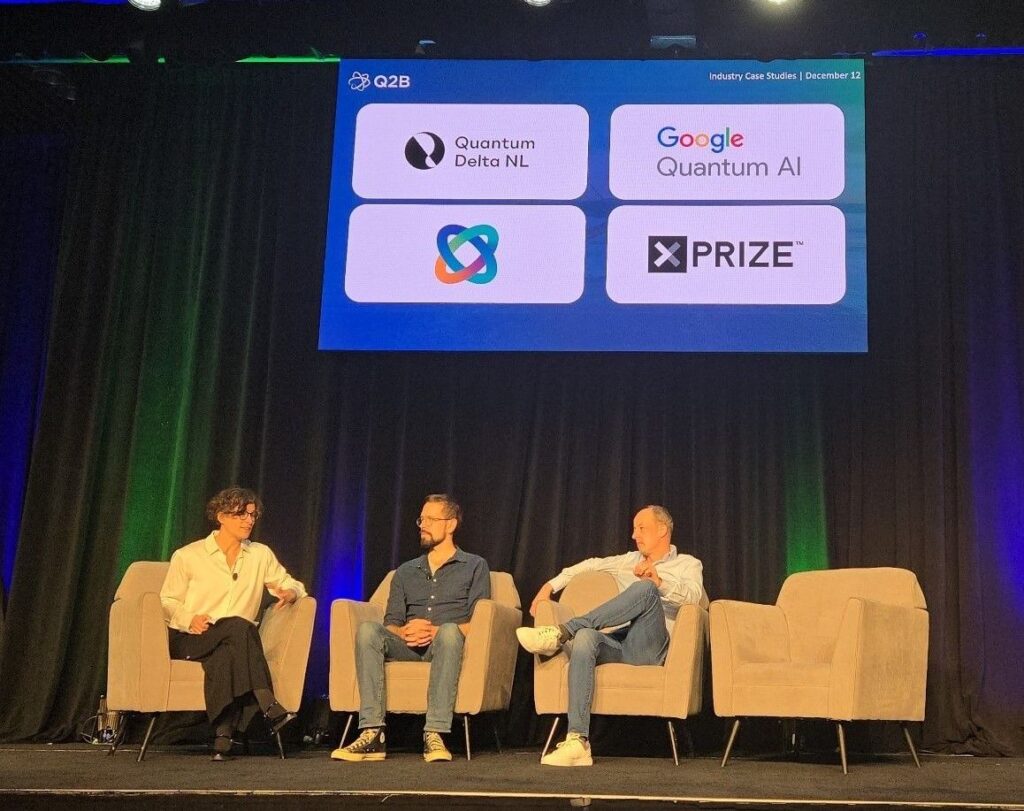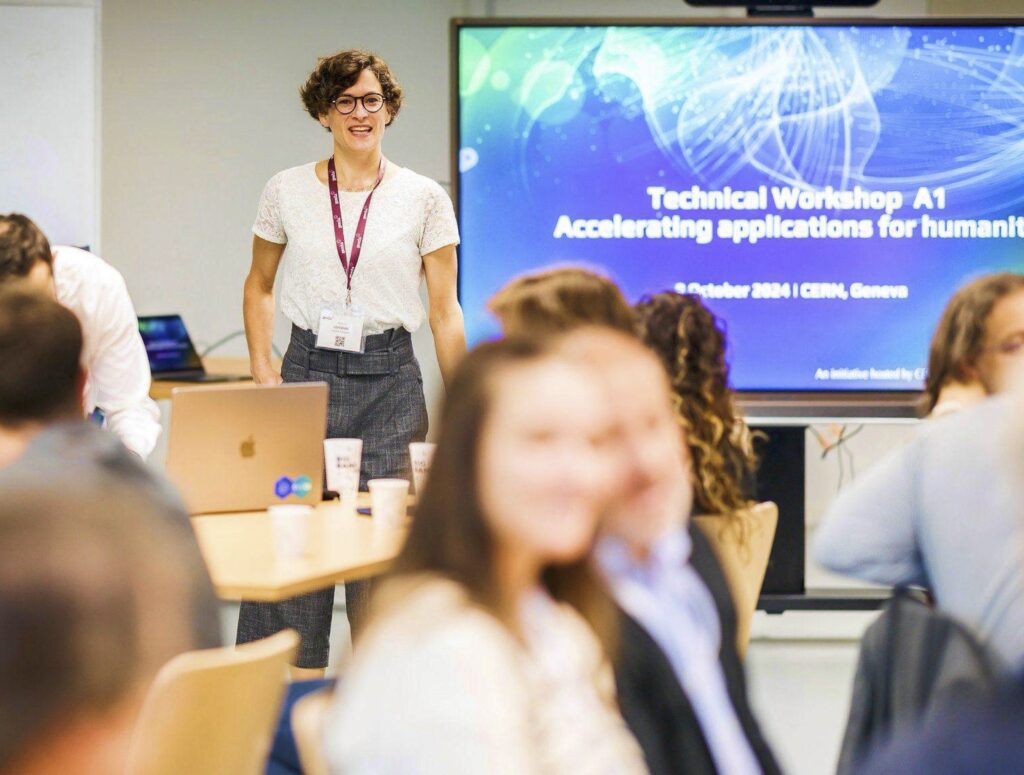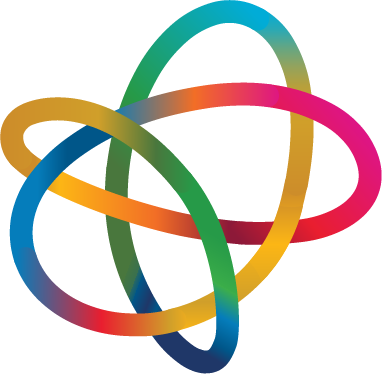Quantum Computing for the benefit of humanity
Interview with Catherine Lefebvre, Senior Advisor at the Geneva Science and Diplomacy Anticipator (GESDA) for the Open Quantum Institute, a GESDA initiative hosted by CERN
Imagine it’s the year 2035. Quantum computing has reached some maturity, revolutionizing industries and solving complex problems at an unprecedented scale. Large corporations rely on quantum systems to accelerate technological innovation. But has this progress been shared equitably? Has quantum technology been used to tackle humanity’s most pressing challenges, such as strengthening global food security, improving global access to affordable essential medicines, and reducing carbon emissions? Or has it remained in the hands of a few, widening the gap between those who have benefited from it and those who don’t?
In the framework of the International Year of Quantum Science and Technology, we interviewed scientist Dr. Catherine Lefebvre, who specializes in exploring quantum computing-related thought scenarios. She is a Senior Advisor for the Open Quantum Institute at the Geneva Science and Diplomacy Anticipator (GESDA).
“At GESDA, what we do is to anticipate future scientific and technological breakthroughs in the next 5 to 25 years, as well as the potential related challenges, not only in quantum but also in many other scientific fields. From these challenges, we explore the potential opportunities to make sure that these breakthroughs could benefit all, and not only the rich countries that typically develop and use the technology. With a taskforce of experts, we work towards accelerating a solution and transforming into concrete actions that could lead to a better scenario for everyone. This is how we co-created the Open Quantum Institute,” Catherine explained.
Concerned about the impact of emerging technologies on humanity, she and her colleagues, with the close collaboration of research, diplomacy, industry and impact experts around the globe, launched the Open Quantum Institute (OQI) in October 2022—a bold step toward making quantum computing more inclusive and beneficial for our society and planet. “The mission of the OQI is to promote global, equitable and inclusive access to quantum computing and, through that, to explore applications of quantum computing that would benefit humanity.”
History has taught us that when transformative technologies—like social media or artificial intelligence—are concentrated in the hands of a few, the consequences can be profound and unpredictable. Today, as we stand on the brink of the quantum era, we face a similar crossroads. Looking at quantum computing through an international lens, we see stark disparities: many countries lack the infrastructure, expertise, or funding to participate, leaving vast potential untapped. If quantum technology becomes the exclusive domain of the wealthiest nations or corporations, we risk deepening the digital gap and reinforcing global inequalities.
Catherine enthusiastically explains how she got involved at GESDA and how she and her colleagues helped bring the Open Quantum Institute to life:
“I was doing a training in science diplomacy during the pandemic when I got the opportunity to learn about GESDA. Thanks to my mentor, Prof. Barry Sanders, I was able to join the task force on the quantum initiative, and soon after my involvement grew, and I became part of the GESDA team, as a volunteer. We co-designed a solution that would respond to the opportunity quantum could present, translating it into an institute, which is now the OQI. Towards the end of the OQI incubation phase in 2023, we confirmed CERN as partner to host the institute and help scale it for the three-year pilot, with the support of UBS [the Swiss bank UBS Group AG]. We officially launched the activities at CERN in March 2024, and we are now celebrating a successful first year of the pilot!”
So, what exactly is the mission of the Open Quantum Institute, and what steps its stakeholders are taking? Catherine dives into these questions with clarity and insights.
A promising quantum future for all rests on four activity pillars
First activity pillar: Accelerating applications for humanity
“The first OQI activity pillar is on exploring applications. We’re using the framework of the UN on the Sustainable Development Goals [SDGs] and beyond to explore where quantum computing approaches could be applied to relevant problems that would help accelerate the achievement of the SDGs. For that, we put together multidisciplinary teams of quantum experts, subject-matter experts and UN organizations or large NGOs from all around the world to explore potential impactful use cases of quantum computing.”
Second activity pillar: Access for all
“Once the use cases reach sufficient maturity, we collaborate with industrial partners who are donating credits for the implementation on quantum devices: first on simulators, and then on QPUs [quantum processing units]. This is the second pillar: focusing on access.”
Third activity pillar: Advancing Building Capacity
“The third activity pillar focuses on how to scale globally, how to onboard quantum-underserved geographies in entering their quantum journey, and eventually participating in the exploration of use cases based on their own local challenges. This is working towards increasing inclusivity and equitable access with training and upskilling activities.
Last year, we launched an educational consortium with several academic and industrial education providers to share best practices, put together resources, and make them accessible to target geographies, which are Africa, Southeast Asia, and Latin America.
Together with the educational consortium members, OQI is supporting local organizations to deploy educational activities, such as hackathons. For instance, there will be an OQI-supported hackathon in Ghana in July, and several others in Greece, Egypt, Thailand, etc., in 2025 and 2026. Additionally, we are looking into mentorship and internship programs helping to build knowledge capacity globally.”
Fourth activity pillar: Activate multilateral governance for the SDGs
“The other target audience for OQI in terms of education are diplomats, ambassadors, and policymakers. This ties to the fourth pillar, which involves governance and science diplomacy. Equipping diplomats with science-based information about what quantum means, where do we stand in terms of technological development, what are the possible challenges and the geopolitical implications; we provide a neutral multi-stakeholder platform to foster a multilateral dialogue with the goal to accelerate an effective governance approach.
We have designed a Quantum Diplomacy Game, which is a role play simulation to immerse participants in the anticipation of the geopolitical implications of quantum computing and actively explore multilateral governance. The game was played in Washington and at the Technical University of Munich earlier this year and will be “played” in the Philippines, Costa Rica, etc. during the pilot of OQI. ”
Enduring challenges to ensure quantum for good and for all
As Catherine reflects on the collaborative nature of the Open Quantum Institute’s work, she highlights on the key challenges they face—bridging gaps in expertise and communication across diverse stakeholders and geographies.
“One of our great challenges is in the translation. I am going to give you a concrete example of use cases development. Because these are multidisciplinary teams, we constantly need to find a way to speak a common language to be effective in the collaboration between, for instance, quantum experts and domain experts.
Another challenge is in upskilling researchers and developers who want to participate with ideas to carry on a use case. We have developed a rigorous methodology to guide the participants from the ideation to the proof-of-concept so that strong use cases could lead to implementation on quantum computers in the future. The snapshot today is that too few participants from quantum-underserved geographies have the level to meaningfully contribute to building strong use cases, so there is a lot to be done for OQI and our collaborators. This is the reality, and it is also validating the need for our education activities.”
While these challenges highlight the complexity of building inclusive and high-quality quantum use cases, Catherine emphasizes the importance of fostering collaboration through rigor, resilience, and practical problem-solving.
“We need to be realistic; no one learns quantum overnight, and not everyone needs to know quantum computing in depth. In exploring use cases, it’s important to bring local experts who with know about their challenges, their own realities, and so these use cases could have real impact, especially on underserved communities and geographies. For example, in certain geographies, they want to be active in preventing natural disasters, how we could predict floods more accurate with quantum computing. This is a real problem in Malaysia, for instance, it is a problem close to their heart. At OQI, we are supporting the development of use cases that will be impactful, and collaborating with local so that the impact can be directed to these affected countries.”
Passion for science and collaboration as motivation to foster global changes
The OQI approach reflects more than just strategy—it speaks about the values that have guided Catherine’s journey from the start. She’s motivated not just by the technology itself but by the global collaboration it can foster and the global challenges it has the potential to address. A deep passion for quantum science and a strong belief in the power of collaboration have shaped the professional path of this remarkable woman in quantum since she was a young girl.
“When I was six, I decided I wanted to become a chemist – although at that age I didn’t really know what that meant! As an undergraduate student, I first learned that I hated experimental chemistry laboratories, and luckily, I quickly found out a course on quantum mechanics applied to chemistry and I said, this is it, this is what I want to learn more. I ended up doing a PhD in theoretical chemistry and molecular physics. From there, I worked as a researcher for several years. Aside to quantum, my other passion that has grown since my PhD years is collaboration. My PhD thesis was in cotutelle between two universities, in Quebec and in Paris, and I learned to build bridges between the two departments in chemistry and physics in two different countries. As a theorist, I was also involved in multi-country collaboration with experimentalists. Being exposed to different scientific cultures and different approaches to science was wonderful. That early exposure fueled my passion for collaboration and crafted my role and my career as a researcher, and led me to science diplomacy.”
Although 2035 is not really that far, quantum computing is still today in its infancy. The future is wide open, which means we have the unique opportunity to co-shape its path for the greater good. And everyone can be involved.
“To be involved in science diplomacy in action, like what we do at OQI in the field of quantum computing, you don’t necessarily need to be an expert in quantum. For non-experts, it’s an opportunity to stay informed about the scientific development and engage actively in framing the future through the dialogue and exchange between the scientists and decision-makers.”
While OQI focuses primarily on quantum computing, other emerging quantum technologies may also contribute to addressing the Sustainable Development Goals (SDGs). It is essential for diplomats and organizations like GESDA to remain attentive to these developments. “My message for anyone is that what is important is to be curious, understand the importance of cooperation at the intersection of science and diplomacy. We have this great opportunity to bring quantum for the benefit of all humanity, the time is now to be active.”
Featured Image by Marc Bader.
For general questions about IYQ, please contact info@quantum2025.org. For press inquiries, contact iyq2025@hkamarcom.com.

